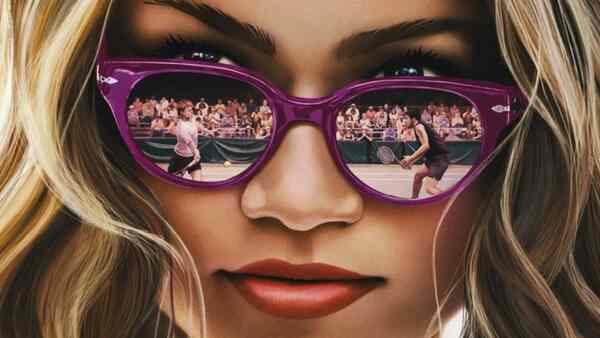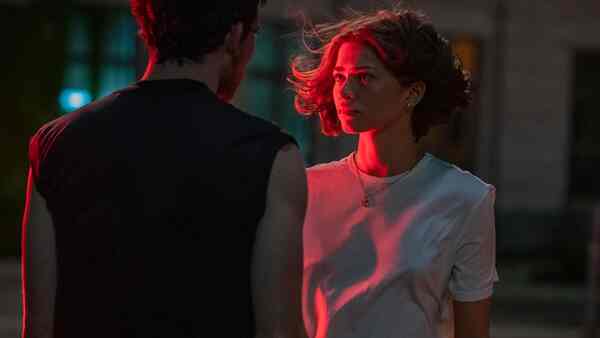Challengers: Beauty, Ambition & The Exquisite Torture Of Fickle Passions
The tennis court and the bedroom serve as a springboard for games of desire and rivalry in Luca Guadagnino's Zendaya-starrer.

Last Updated: 04.58 PM, Apr 27, 2024
Heat and sweat pour off the screen in Luca Guadagnino’s Challengers. Desire saturates the atmosphere like humidity. A night of drinking edges towards a threesome when childhood friends and doubles partners, Art (Mike Faist) and Patrick (Josh O’Connor), invite 18-year-old tennis phenom Tashi (Zendaya) back to their hotel room. Lips rally. Tongues volley for control. The three hot and rising sports stars, played by three hot and rising movie stars, make out like they want to devour each other and be devoured, evoking the ravenous desires of the young cannibal couple from Guadagnino’s previous feature Bones and All. Longing seeps through the screen, pulling us in like voyeurs and fogging our glasses. We can feel the pulse of the passions fuelling their hunger. Just as things get hot and heavy, a bucket of cold water is thrown on our expectations. We are deprived of a climax. Without mincing words, the film blue-balls us. All the same, it is because desire is forestalled instead of fulfilled that it cuts much deeper.

With A Bigger Splash and Call Me by Your Name, Guadagnino showed he was a natural chronicler of the summer, distilling the season in all its airy possibilities into rhapsodic dramas of the senses. Now, with his new film, he builds on his reputation as one of contemporary cinema’s premier sensualists. Challengers positively quivers with beauty, ambition, and the exquisite torture of fickle passions. The tennis court and the bedroom serve as a springboard for games of desire and rivalry. Though we may be watching a mixed-throuple contest in which competitiveness is like viagra and lust in turn stokes competitiveness, there is a flowing vitality to the film that ensures it wins all the crucial points without making any unforced errors.
Not long after the almost-threesome, Tashi dated the more swaggering Patrick for a brief while. Not long after that, when a knee injury ended her career and forced her into an early retirement, she went on to marry the more reliable Art. When we meet the couple in the present, we learn she has been coaching Art into the champion she could have been. After Art suffers a string of losses, Tashi enters him into a local tournament to build up his confidence ahead of the US Open, the only trophy he needs to complete a career slam. Bad blood spills over when his opponent turns out to be his former best friend and her former boyfriend Patrick, a man so down on his luck and buck he has been using Tinder like a free hotel service, hooking up with whoever will offer him a bed for the night so he doesn’t have to sleep in his car.

As Art and Patrick prepare to go head-to-head on the court, with Tashi closely watching from the side-lines, the film bounces back and forth between their youth as emerging stars and their present as challengers, between court and courtship, between the forming, shattering and reforming of an explosive love triangle. The changing shape of the trio’s relationship thereby reveals an eternal struggle of lust vs love, passion vs security, fire vs ice (as Patrick and Art were once dubbed as junior doubles champions). It also raises many questions: Is the grudge match a smokescreen for Tashi and Art to strengthen their relationship? Are Art and Patrick competing for Tashi’s heart? Is Tashi using Art’s romantic envy to rekindle the fire in his belly? Is her love and resentment tied to the level of his competitiveness and the extent of his pliability? Did she marry him partly because he was easier to control than Patrick? Does she manage him so as to enjoy second-hand the triumphs her injury denied?

The answers are never a simple yes or no with an inscrutable enigma like Tashi. In this summer heatwave of a film, she is a gathering storm. In a court of shifting power dynamics, she establishes the baseline by withholding love and longing for it at once. In the game of desire, Art and Patrick may be the challengers, but she is the umpire. In what could be her most revealing performance so far, Zendaya treads a deft path between sexy-volatility and vulnerability in a way that suggests the depths Tashi keeps hidden inside herself. She maintains a sense of self-awareness about her looks and their effect on those around her. Faist as the shy Art and O’Connor as the brash Patrick may not be radiating at the same wattage, but they play off each other to perfection. All three make for a winning team on the court and off, and even as a pair — whatever the combination. Despite playing characters who are as confused as contradictory, they are shrewd enough performers to let us be frustrated by them without risking our affection.

Tennis here is more than just a sport, it’s a relationship (as Tashi describes), it’s a dialogue, it’s a dance, it’s foreplay, it’s sex itself. Bodies writhe and charge forwards and backwards. Beads of sweat drip from the brow. The thrusting. The grunting and moaning. The endurance. The grounded yet agile rhythms of movement. And then there’s the triumphant release. Tennis, unlike sex, may not be a contact sport. But the camera frames it as if it were, assuming the point of view of the players, the spectators, the racquets, the net and the ball. The recurring image of eyes following a ball back and forth like a metronome hand fits in nicely in a film about oscillating desires. Conversely, verbal volleys play out like on-court duels. Keeping the action on its toes is a lively score by Trent Reznor and Atticus Ross. Throbbing electronic pulses play up the on-court intensity, while lending a seductive tempo to the off-court drama.
Watching Challengers is in itself like a tennis match between Guadagnino and the viewer. He points. We look. He sets up the arena, the players, the baggage and the stakes. We play ball. He serves. We receive, we return, we prepare to be surprised.

 Premium
Premium